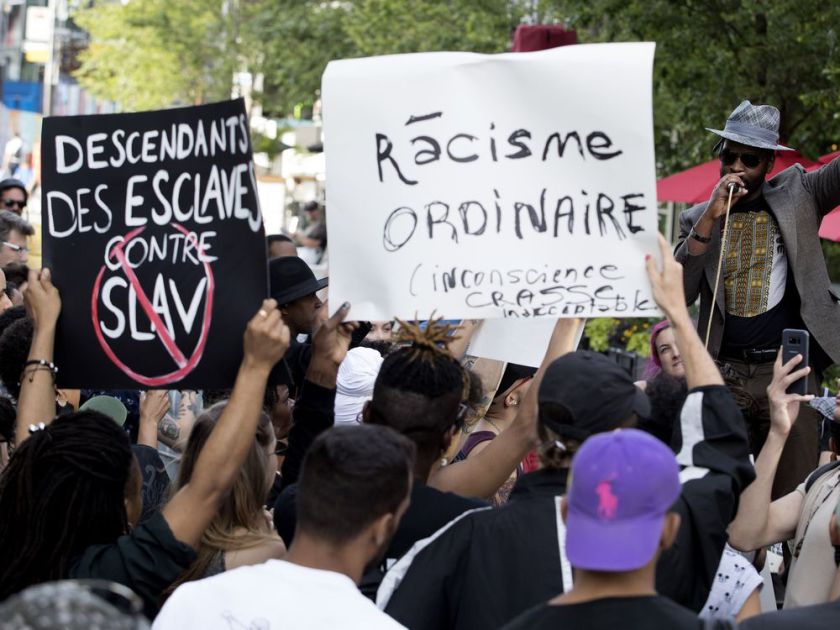Why SLĀV’s Cancellation Was the Right Decision
ARTS, 9 Jul 2018
Rahul Varma - Montreal Gazette
Artists have freedom to express truths and ideas, including uncomfortable and provocative ones, but that freedom must be used ethically.

Protestors demonstrate against SLAV outside the Théâtre du nouveau monde in Montreal on Tuesday June 26, 2018. Allen McInnis / Montreal Gazette
5 Jul 2018 – All artists have freedom to express truths and ideas, particularly uncomfortable truths and provocative ideas; artists have the freedom to learn about cultures and stories other than their own. They should not, however, have the freedom to discriminate, distort and exploit colonial histories.
Cultural freedom is sacred, but it is essential to behave ethically in exercising that freedom. And ethical considerations do not permit the production of a show about black slavery without an equitable participation of black people. In the case of SLĀV, a theatrical odyssey centred on the songs of African-American slaves and forced labourers, directed by iconic techno-artist Robert Lepage and starring celebrated singer/musical director Betty Bonifassi, no such ethics were respected.
In the face of protests and mounting criticism, the Montreal International Jazz Festival finally made the right decision, and announced Wednesday that the remaining performances of the show were cancelled.
That SLĀV would spark justified outrage should have been predictable. The production whitewashes a deeply troubling African-American history in the name of artistic freedom. It is an act of cultural appropriation — nothing new for Lepage, who has time and again proven himself a pro at it, as seen in shows like The Dragons’ Trilogy and Zulu Time, and in his continued practice of colour-blind casting that seems to privilege white actors to play non-white characters.
It should be said that for SLĀV, Lepage and Bonifassi did consult with Aly Ndiaye (also known as Webster), a black hip-hop artist and historian. He strongly stressed the importance of hiring black actresses to play black characters.
The songs of SLĀV were those sung by enslaved Africans mourning for lost loved ones under extraordinarily punishing circumstances. Yet, to the exclusion of black artists, Bonifassi was in the lead role and four of the six of the show’s other performers were white actresses, singing slave songs and picking cotton. Their very presence onstage was a historical distortion. Lepage and Bonifassi showed no sensitivity to the fact that the songs were embedded in the deeply violent and wounding memory of slavery, racism and oppression. Bonifassi, who says she doesn’t “see colours,” simply professed: “We don’t talk about black and white in the show.” Yet race and colour were central to black slavery.
Cultural appropriation is not an acceptable way to explore the history of slavery, oppression, migration and mass incarceration. If Bonifassi and Lepage wish to consider these histories, I would invite them to honour, respect and appreciate people of colour as well as contribute to dismantling systemic racism. I do not, however, invite them to use their iconic position to reproduce and maintain oppressive structures.
An alternative to cultural appropriation is cultural exchange, in which people from diverse cultures and colours would come together as different but equal to learn from each other and create art. Such a cultural exchange would transcend colonial history and beliefs as well as transform misconceptions and misrepresentations into truth.
SLĀV isn’t a fictional narrative — it is a show built on artifacts of a people’s suffering, and those people are noticeably absent from the stage. Had Lepage and Bonifassi consulted and actively worked with black artists, beyond their two choir members, SLĀV wouldn’t have been a show of slavery, oppression, migration and mass incarceration. It would have been a show of resistance and liberation.
And this is what Lepage and Bonifassi seem unable to comprehend. In a statement last month, they said, “the history of slavery, belongs first and foremost to those who have been oppressed …. but this history was written by the oppressors as much as by the oppressed, by whites as well as by blacks.” Therein lies colonial ignorance: making equivalence between oppressed and the oppressors as if the oppressed had access to the same means to resist as did their oppressors.
_________________________________________
Rahul Varma is a Montreal playwright and artistic director of Teesri Duniya Theatre.
Go to Original – montrealgazette.com
DISCLAIMER: The statements, views and opinions expressed in pieces republished here are solely those of the authors and do not necessarily represent those of TMS. In accordance with title 17 U.S.C. section 107, this material is distributed without profit to those who have expressed a prior interest in receiving the included information for research and educational purposes. TMS has no affiliation whatsoever with the originator of this article nor is TMS endorsed or sponsored by the originator. “GO TO ORIGINAL” links are provided as a convenience to our readers and allow for verification of authenticity. However, as originating pages are often updated by their originating host sites, the versions posted may not match the versions our readers view when clicking the “GO TO ORIGINAL” links. This site contains copyrighted material the use of which has not always been specifically authorized by the copyright owner. We are making such material available in our efforts to advance understanding of environmental, political, human rights, economic, democracy, scientific, and social justice issues, etc. We believe this constitutes a ‘fair use’ of any such copyrighted material as provided for in section 107 of the US Copyright Law. In accordance with Title 17 U.S.C. Section 107, the material on this site is distributed without profit to those who have expressed a prior interest in receiving the included information for research and educational purposes. For more information go to: http://www.law.cornell.edu/uscode/17/107.shtml. If you wish to use copyrighted material from this site for purposes of your own that go beyond ‘fair use’, you must obtain permission from the copyright owner.